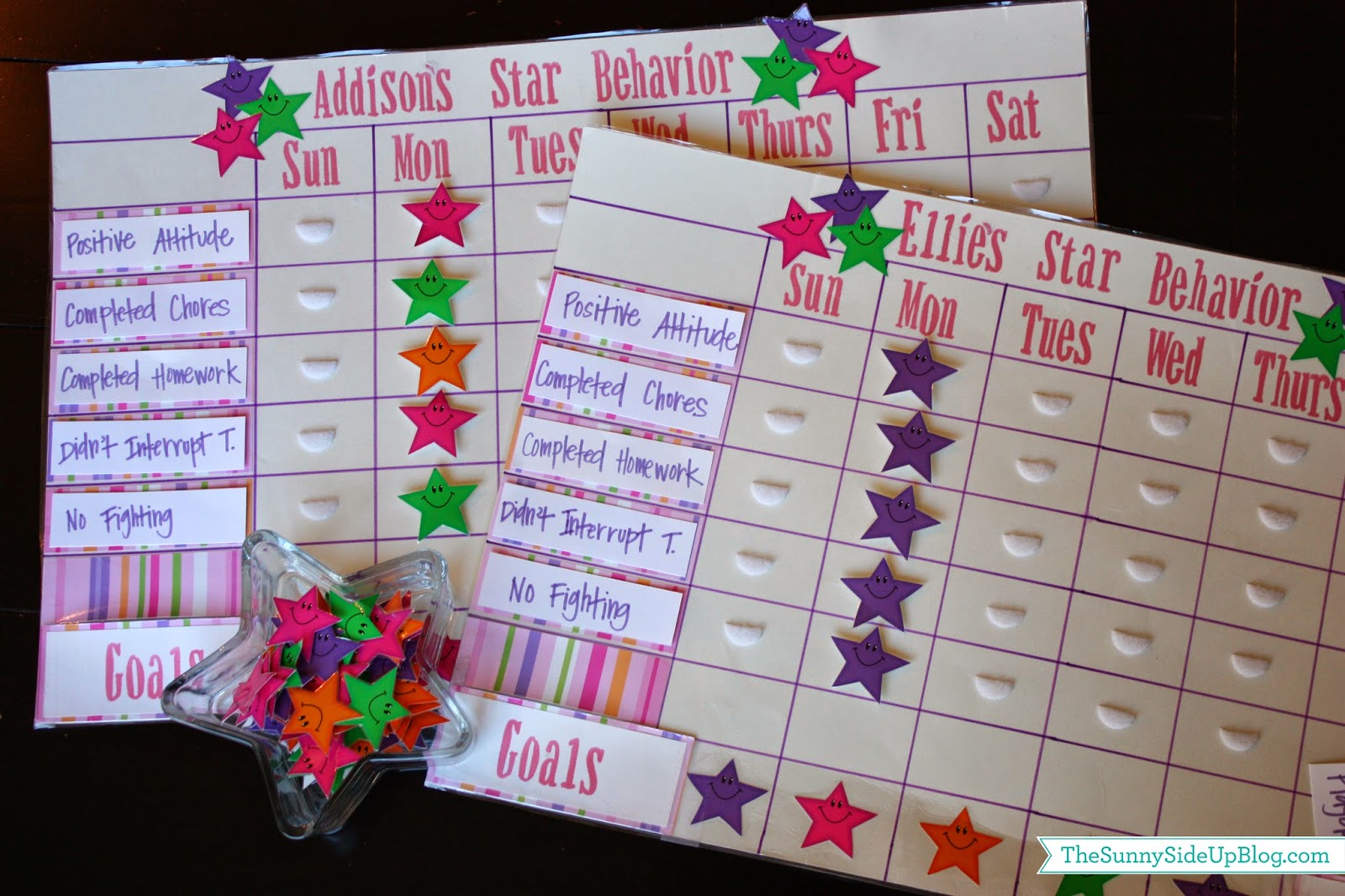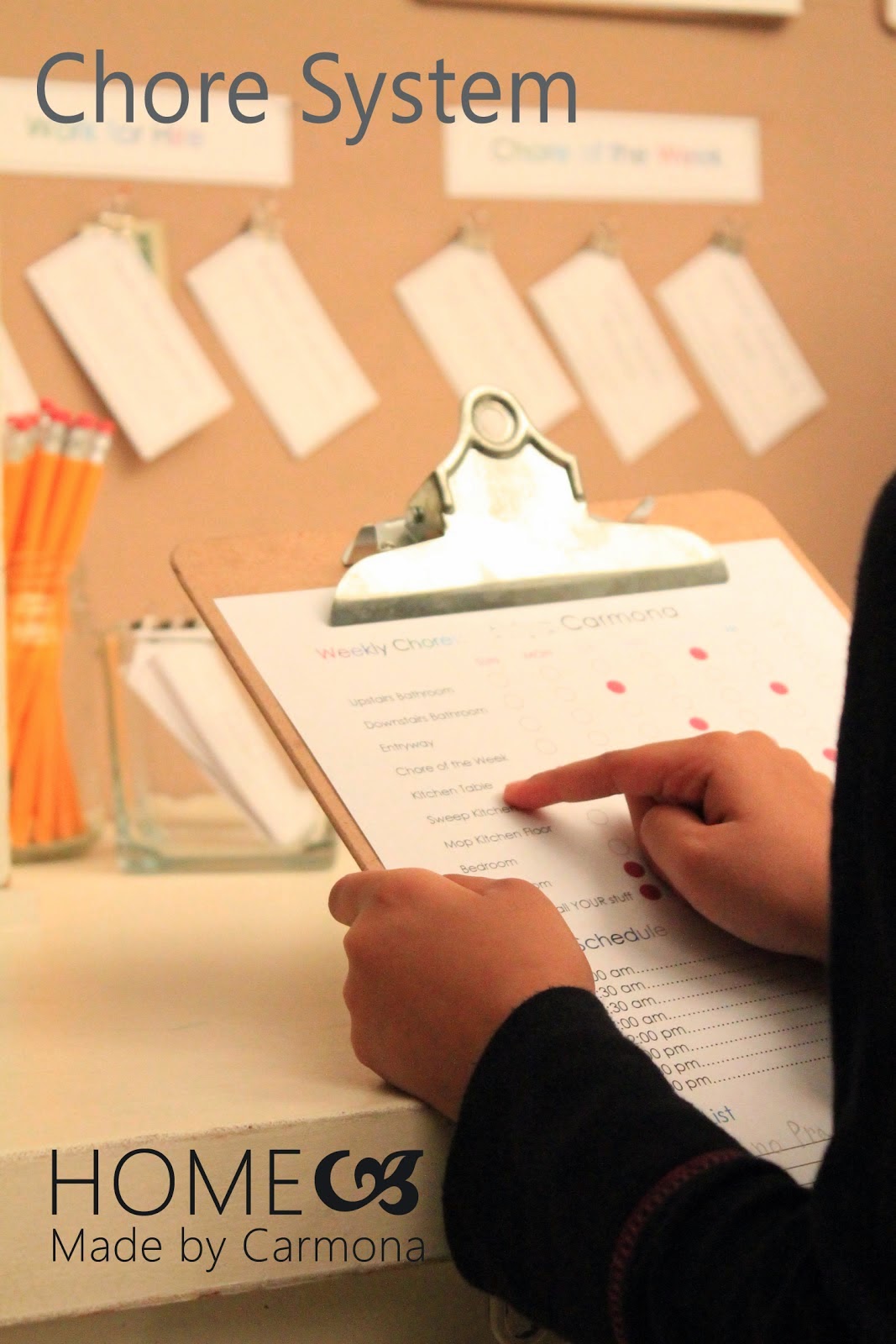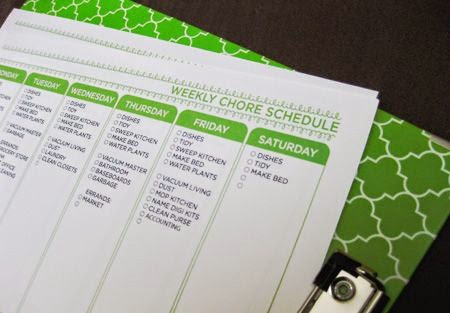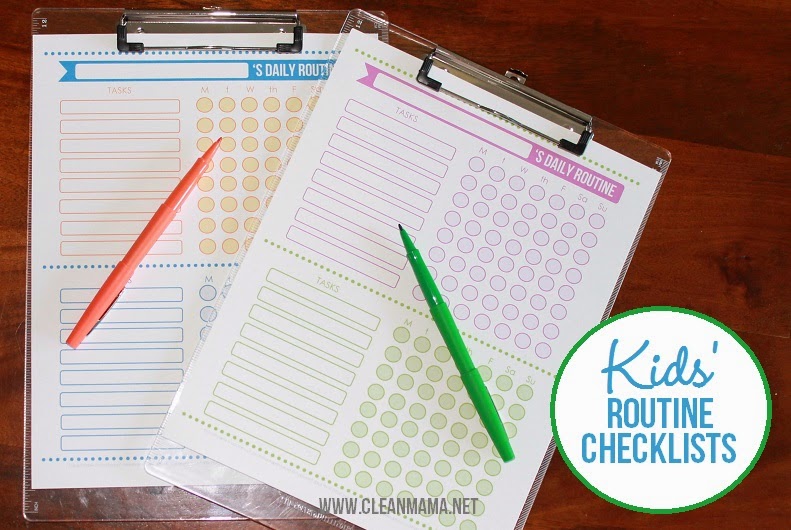Talking chore charts today! And allowance systems for kids. I’ve been thinking a lot about this for the past few weeks. Our Star Behavior Charts served us well for years. Perfect for my girls when they were younger. But now they are getting older (even though I tell them daily not to) and it’s time to teach them how to earn and manage money. We’ve never given our kids an allowance. They’ve always had to pitch in with house work and my girls have become really good helpers, but I can tell that it’s time to give them daily responsibilities and a chance to earn some money of their own. Aside from giving them the opportunity to spend their own money, I also want to teach them the importance of saving and giving. Here are some fun charts and systems I’ve found on-line that have given me a few ideas…
I’ve also heard that Smart Money Smart Kids is a really good book that helps teach some basics for working, spending, saving and giving so I’ve ordered it and I’m hoping to read it this summer.
I would love to hear what you do or have done with your kids. Do you pay your kids an allowance? Have a set chore chart? How do you decide which chores they need to do just to help out and which chores they get paid for?
Spill it! I need all the help I can get!
:)
xoxo, Erin








When my kids wanted something really bad. (and I didn’t buy it for them.) We set up a system and talked about things they could do to earn money. They were good about saving their money so they could buy the item they wanted. It worked out well. It also taught them the value of a dollar. I never had set chores for my kids, but, when I needed help with something they were always willing to pitch in and help.
I love Dave Ramsey and I think that book would be an amazing read.
We have always instilled into our kids about giving from a very young age. To this day I can honestly say, that they have given with pride and such a warm heart.
I love this post Erin!!!
check out the 71toes blog. search for her allowance slash money system. i love love love it. she goes into great detail. her blog is one of my favorites!
http://www.71toes.com/2012/11/a-money-system-that-works.html?m=1
I do pay my kids for helping out ages 7 and 9. I would like to come up with a chart but for now the kids have set chores they do every week. Example my son vacuums upstairs and downstairs and my daughter cleans both bathrooms once a week. If they want extra money they can do extra jobs. There are jobs they just have to do that they don’t get paid for like cleaning their bedrooms, taking care of their laundry and cleaning up messes they make.
I saw this website once that separated chores around the house into Family Jobs and Money Jobs and that is, I think, exactly what I plan to do with my kids. There are some chores they have to do just because they are members of this family and live here – there are some chores that can do if they’d like to earn money. I love that idea of still requiring them to do their part (no money involved), but they can take control and determine how much they want to earn by the effort they put in to the additional stuff.
I don’t plan on ever doing an “allowance” (free money with no strings attached), but I don’t completely dislike the idea of it either, as long as you then require your child to really learn to budget. If they use it all on one big item and then realize two days later they want something else, no giving in. They have to wait until more money comes around and realize that it’s not a bottomless resource.
Erin, I’ve been wrestling with this too! Here is the system I just came up with. It has been working well, but I still struggle with the allowance idea. Can’t wait to hear other people’s ideas on how to make it work! http://www.simplelifeofafirewife.com/2014/05/chore-charts.html
-Emily
Allowances and chores at our house are mostly separate. I believe that if you’re in a family, you get to do chores. We rotate our chores on a wheel with six slots – I have 5 kids and Mom & Dad are together. Even my 2-year-old is in on the rotation, although she gets most of the job done with Mama. :) The chores we do are unload the dishwasher, dust, sweep the kitchen, garbage duty, clear off the table, and laundry. Everyone puts away their own laundry, and they know that jobs we don’t do daily like cleaning the bathrooms and sweeping are always going to pop up a couple of times during the week. They can’t play computer until all their work is done – that includes making their beds, saying morning prayers, practicing the piano, and tidying their room. And if they say their bored – I’m that mean Mom who always has baseboards to clean! :)
My kids get allowances once a month. I used to do it weekly ($2 a week), and it was so hard to get change that often! I treat it like a paycheck – 50 percent goes to the kids, 40 percent goes to their savings, and 10 percent goes to tithing. I give each child $10, so that breaks down to $5 spending money each month. I really wanted my oldest to stop asking for every. single. toy. whenever we went to the store – so now if someone asks I say, “Save your money!” I want them to always save up their money, even when they get a real job, and this is a great breakdown when they’re still getting room and board for free. The only thing they don’t have to save money from is gift money – that’s completely theirs. My two older boys also earn money by mowing the lawn – $5 for the front or back (before the breakdown).
For us, this is the system that works the best – the kids help out with chores and still get a little spending money. They can’t get too much that’s big, but they can save for a while to get something really awesome. So far my boys have saved for Lego sets they really wanted, and my oldest just got a Nerf gun that was $40. It’s really teaching them that they can wait for the things they really want. :)
We give our kids a weekly allowance. It’s not tied to chores or behavior. They’re expected to do chores and behave respectfully without any bribes or compensation. The allowance is simply a lesson in budgeting. We start at age four with .50 a week. They only lose their allowance as natural consequences i.e. if they carelessly break something, we’ll withhold allowance to pay for a replacement.
The system works very well for us and couldn’t be more simple and straightforward, meaning less user error by me.
I like this! Simple and I can do that :). Thanks for the tip! My girls are 9,5,&3 and have chores but I didn’t want to link it with money- this makes great sense! http://www.robynsnest.blogspot.com
When I was a kid, we were expected to help out around the house.
We were also given a weekly allowance. The two were seperate, not linked.
This gave us the understanding that we didn’t “deserve” money because we did the chores. If we wanted something, we would have to plan and save.
If we didn’t help around the house, we would get consequences (privilages taken away) but we would always get the standard allowance. It was not a tool for punishment.
Occasionally, if we were saving up for something big, we could request a “job”. This was usually a larger task (like detailing the car), always above and beyond the standard chores.
At our house we use myjobchart.com It is awesome because I set up the daily chores and customize them for each child. Then I add “extra” chores for when they are really in the helping mood. The kids are responsible to do their chores and mark them off (on the computer) no extra stickers or charts. And my favorite is that they chose how to use the points. They can redeem points for fun activities- make cookies, go to the park, special Daddy day… or cash out the points for money when they really want to buy something. This system is wonderful for our family!!
My kids are 3, 5 and 7 and we use Financial Peace Jr. (also a Dave Ramsey product). My kids don’t yet get “allowance” for chores although they can earn money for doing some extra things when they are wanting to save up for something they’ve had their eyes on. They also get money from family for Christmas and birthdays and we wanted to teach them early on that it’s important to save and give as well as have the fun of spending so we really liked the Financial Peace Jr. setup. My husband and I went through the Financial Peace University and loved it. We thought it was important to teach them the value of money early on. The Financial Peace Jr. gives them hands on materials so they can see what they are saving, giving and spending.
I am trying something new this summer and hopefully it can continue during the school year. We are on month two and so far so good. My kids are 15, 13, & 10. Two girls and a boy. I am sick of being a bank. I need money for a movie, Starbucks, breakfast, a shirt, a cup. So I have decided to pay each girl $60 for the month. 10% must go to savings. This is all they get from me except for the essentials of life:) They need to budget and choose how to spend their money. In return, they have daily chores of picking up their rooms, their stuff around the house and dog duty. Once a week they dust/vacuum their rooms, bonus room and bathroom. Additionally, they are given one deep cleaning job every two weeks. (blinds, baseboards, any job I do not want to do) Payday is the 15th of every month. My 10 year old son gets $20/month. This may seem high, but teenagers are always on the go and if I do not limit it I end up spending double that in a month. Some days the kids rooms are not picked up. These days I remind them and add a job. It truly is working so far.
Hi Erin
So glad you posted this today bc I need to rework my kids responsibility chart before school,& I keep forgetting. We use the Love and Logic System for money/chores (with a few tweaks) so my kids do their “chores” for free :) and we call them their “responsibilities” bc they r responsible for doing them bc they are part of a family and everyone has to help in a family. We give them their allowance at beginning of week and they automatically put it into their banks and the rest sits in a jar on counter until end of week. They have a special bank that we made that has 4 compartments, 1 for tithing, 1 to save money to go on a mission for our church when they are older, one for college, and one for savings. So they put 10% in each of those banks and then they put the rest in their jars. But we also “charge” them for things. So for instance, we put their money in theirs jars at the beginning of the week (after they have paid tithing etc. then during the week if someone is complaining excessively I might say. “Oh no! I charge fifty cents to listen to whining” and then the lose fifty cents of their allowance. And then at end of week they get to keep what’s left and put it into their wallets. They bring their wallets whenever we go shopping,& I let them spend however they want. The key to love and logic theory is that you WANT THEM TO DO DUMB THINGS now, as opposed to later. So they can learn through their own experiences
instead of lectures bc lessons from experience tend to stick better. That’s our basic system but my kids are still pretty young . We’ve been doing the responsibilities since they were 3, but allowance just started this year at 5. So far it’s been a great system for us. I think? But I am so interested to hear other ideas! I think maybe this topic deserves a second post, bc there are so many good ideas out there and so many different sorts of families and children. Thank you for getting me thinking :) you always seem to be a step ahead of what Mommies need to be thinking about :-D
Michele
Las Vegas
I’m looking forward to the comments you get too! I am on the fence about how to do the whole allowance/distribution of chores thing too. I constantly hear, “why doesn’t ___________ have to do anything…or “that’s _____________’s job (fill in blank with other child’s name.) Since there is an age gap between my 10 and 5 year old, I have to try to make the chores “fair” but age-appropriate. No easy task!!
This summer I have become more consistent about “morning chores” before they do fun stuff(tv, wii, ipod, etc.) These are making beds, putting up dishes, cleaning off table after eating, putting up laundry, etc. I write the list and they like to check it off (especially the five-year-old.) Last week, they were paid $1 for doing their daily chores but were already asking for a raise! I am trying to keep a stash of dollar bills to pay them…last week was quarters which they don’t really like!
I gave a “bonus” to the 10-year-old who had to keep it “confidential” from her brother because she did more work than he did. I called it a “bonus” because it is not something she will get all the time, but for her helping with a harder, more time-consuming task (sweeping and mopping a large area) with a positive, non-complaining attitude. When they start getting their own money, they also pay for their own “treats” sometimes- ice cream, etc.
This is still a work in progress, and it will change when the hectic mornings of school begin but it is working pretty well for the lazy days of summer. I am hoping it will help incorporate better habits for the school year though, since they will have become use to doing it all summer.
Well there you go! Hope it helps!
We implemented a new system this spring that seems to be working so far.. ( 5 kids age 8 to 7 months). I made pretty detailed charts of daily responsibilities (make bed, brush teeth, homework etc) and let them each choose a chore they wanted to be in charge of on a daily basis (entryway, dishwasher, floors etc). If they fulfill all of those responsibilities without whining or reminders then they have the opportunity to do additional chores for money. I made a list that clearly spells out what I was willing to pay for each job and posted it right next to their lists. So far has been good. The 8 year old is motivated and often will work and save for things he wants at target, extra treats or whatever. The 6 year old not so much and often ends up sad that his brother can afford to buy things that he can’t.. we just remind him he has the same opportunity to earn and it’s all about the choices he makes. Hopefully that lesson will start sinking in soon! :)
My boys have chores during the summer and earn an allowance when they are completed. Payday is Sunday. They have chores during the school year, but there are fewer of them since they are not home to do many of the tasks (clearing the table after lunch, packing the car for trips to the pool etc.). They each have a set of responsibilities during the school year, but they know it’s not an opportunity to earn money but to help our household run and enable us to do fun activities, go to school functions etc. My oldest is 12 and he really understands how to save for certain items and contributes in our weekly church collection. The middle boys generally save for Legos and the snack bar at the pool :) I really like Dave Ramsey and would like to read this book- thanks for sharing that one!
Check out Power of Moms website and look into their family systems, tons of fantastic ideas. Also read the book The Entitlement Trap by Richard and Linda eyre, it’s really good with great ofeas
Of the examples you’ve shown I really like the one with the clothes pins. It’s visual and doesn’t take a lot of extra time to complete…just move the pin to the done side…done! I love it.
My kids are all adults now but this is how we handled chores and money: No allowance…ever. Whatever needs to be done to keep the house running smoothly was part of the chore list. We rotated chores on a weekly basis so they didn’t end up doing the same chores all the time. And, I wanted my son to clean toilets and do dishes and my daughters to do yard work. Everyone needs to learn everything. So, I had three kids so we had three chore sets and they rotated them. They earned money by doing extra things for me that were not on the chore list. Every Monday I would post a list of things that weren’t necessities but really needed to get done, like cleaning out a closet or washing the car. Whatever was age appropriate and needed to be done at the time. The harder or more time intensive the chore the more money they made. They could pick off the list and do the chores (on Saturday)or not but whatever chores were not claimed by Thursday night were not available. If you wait too long you don’t get a paying chore to do. Trying to teach not to procrastinate also. As far as how to handle money, I wish we had done a better job with this part. We tried the save some/spend some method but I will admit we weren’t really good with it.
Best of luck with this. I’m looking forward to seeing what you choose. :)
I have read the Smart Kids Smart Money book and I love it. I was looking for away to teach our children about money better as I was sick of the constant ‘can I have that’. They have always had chores – make beds, put clothes away. set table – and they used to get an allowance, although it fell by the wayside. Now, they still have to do their chores as they are things that everyone in a family does. But they earn pocket money by keeping their playroom and bedrooms clean as these are ‘their’ spaces and it is ‘their’ job to look after them. If they don’t do a good ‘job’ depending on the severity, they get a docked allowance or no allowance. They also help out on the weekend with dusting, sometimes vacuuming. When spring comes I will come up with a list of jobs – weeding, sweeping outside – that can earn them 20c – 50c more each time.
Our financial structure in Australia is slightly different to America, but that book is sooo amazing that I would and do recommend it to everyone to read today.
This is similar to Kariann’s comment above and not as much about chores as it is about allowance, but you may want to tuck it away for later. It worked great! When our children each started middle school (and continued until they graduated high school), they were given a set amount of money per month. It included their lunch money and any “social” money they may need for the month. The best part about this is they NEVER asked for $20 here and $10 there. They knew that they could participate in an activity with friends if given permission AND they could finance. Our daughter was crafty and decided she would make her lunch each day and therefore would have more discretionary money to work with each month. It worked like a charm with all three of ours!
Oh my word. I’ve SO enjoyed reading through all of your comments tonight everyone! Thank you so much for sharing what has worked for you. So many great ideas – I don’t know which way to go with this because you all have such smart systems! Maybe I can combine everything together. And thoroughly confuse my kids. ;)
Thanks again for taking the time to help me with this! xx
We use the accountable kids system. I found it on ettiquette factory website which has some great things too.
Wow, great post and great to read all the ideas for things that have worked for people over the years! Lots of different strategies.
I have 3 little ones like you and I have been tweaking a chore list for the past couple years. My oldest is 9 and my youngest is 3. My daughter who is 9, honestly loves to help me 95% of the time and will do anything I ask her to, scrub bathrooms and wash floors, you name it. In fact, sometimes she is TOO much help and I get frustrated when things aren’t done the way I wish I would have done them. Ha! So don’t feel too sorry for me!
However, I have had luck with Erin Condren’s Functional Family system. You use an acrylic board and hang up chores for the week (I assign each child simple chores to be done each day, sweep, water flowers, clean up playrom). It comes with reward punch cards for each child with their names on the cards which you hang on the board. They can choose a prize (a toy usually) and after the week of chores is completed, I look over what was done and decide how many punches it was worth based on the price of their toy. When the card is fully punched, they turn it in for the toy.
For little ones it is a great visual reminder of working EVERY DAY to earn a reward. If you don’t work every day, you don’t get punches as fast.
It sounds sort of complicated and it can be, but it has been working for us for around a year. I used to give out dollar bills which they loved – but I found it meant nothing to them…my daughter had dollar bills scrunched up all over her toy box and my son thought he could buy a new lego set with a dollar! So then there would be disappointment and he wouldn’t want to do chores anymore. We also used to do dollar store prizes once a week, but they lost interest in those too. So that’s when I decided I would keep the money for now and they would focus on a prize – big or small. If you pick a small, inexpensive prize you will get it sooner than waiting for a big one, it is up to each child.
Hope that was helpful! I love all Erin Condren products for organizing.
71 Toes blog is an amazing resource, I love what they do. She admits, it is complicated tho. I do want to go that route when we start using money with our kids. I really want to teach them responsible money management at an early age.
My 6 year old just started getting an allowance a few months ago although it’s not tied to any particular chores etc. We give him $3/week for spending, $1 towards savings (which when he gets to $10 we’ll open his own bank account with), and $1 towards charity/giving. So far he donated $3 to his school danceathon with it. Our biggest problem is that the $3 a week doesn’t buy much and he goes to the store and has already started negotiating IOU’s on more expensive toys that he wants NOW, so it’s been a tough lesson, but definately worth it.
I emailed you because my comment was too long and blogger wouldn’t let me post it. Haha! But we have started using the system taught in The Entitlement Trap by Richard and Linda Eyre and so far it is working better than previous chore charts/allowance things I’ve tried.
http://www.amazon.com/The-Entitlement-Trap-Choosing-Ownership/dp/1583334157/ref=sr_1_1?ie=UTF8&qid=1405631502&sr=8-1&keywords=the+entitlement+trap
Even tho I don’t have children I’ve really enjoyed reading these ideas, they’re brill.
I especially like the one of where pocket money (allowance) is given but has nothing to do with chores & behaviour. So many times I hear of parents stopping the pocket money because they haven’t behaved very well. It doesn’t teach them anything about money tho.
I often find that children in the US are taught to help in the home much more than British children are. British children usually have a duvet on their bed but don’t even make those!
I feel that giving children money is important because as LDS members it teaches them to pay tithing & the blessings that come from that. Sometimes too they have to Choose The Right on weather to pay tithing or buy a new toy etc.
I hope you didn’t mind me commenting on this even tho I don’t have children.
I love these ideas & as a major supermarket here in the UK (Tesco) says Every Little Helps:)
Here’s a link to a great webinar with Richard and Linda Eyre about their book, it’s worth your time!
http://powerofmoms.com/entitlement-webinar-with-the-eyres/
Heres an app that just blows your mind! the future of chores is here!!! woohoo!!! Hope this helps ladies! :)
http://www.confessionsoftiredmoms.com/featured/chores-for-kids